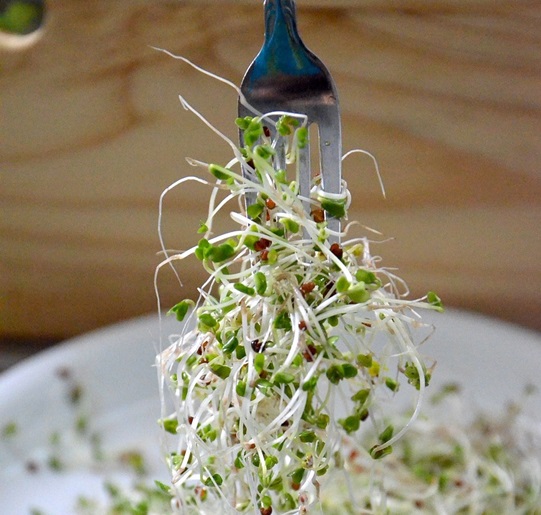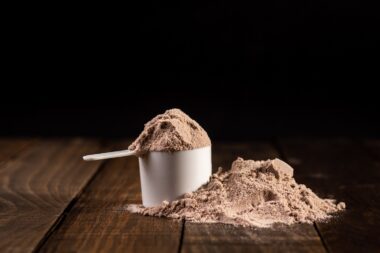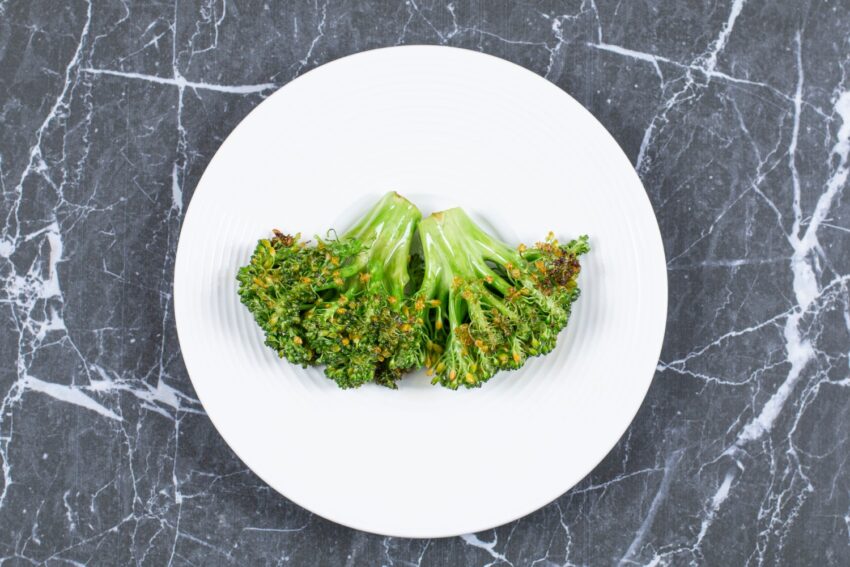Sprouted broccoli is a hidden treasure, safely guarded by the health and wellness community. Simply put, it’s an immature broccoli plant, where, instead of waiting for the seeds to develop their distinctive bushy heads and thick green stem, the sprouts are harvested after just 3 to 5 days. This means that while it shares the cruciferous family name with that of broccoli, cabbage, cauliflower, and the likes, broccoli sprouts have their own unique characteristics.
What do they look like? Picture a dense canopy of tiny, green leaves concealing a thicket of tender, white stems. Much like that of watercress or alfalfa sprouts, they can be used as garnish for sandwiches or as the leafy component to a salad.
Their flavor? A contentious topic indeed; to some, broccoli sprouts have been known to give a peppery taste, similar to that of radish, but a disagreeing majority would argue that they lack any taste at all. So then, why is everyone so gung-ho about these tiny plants?
Well, word of their health benefits have taken the internet by storm in recent years, and the results of various studies look promising. As long as care is taken during the growing process, there is not much reason why you wouldn’t make broccoli sprouts one of your five-a-day staples.

Sprouted Broccoli
Breakdown of Nutrients
Macronutrients are nutrients that the body requires in relatively large amounts, such as carbohydrates, proteins, and fats. Micronutrients, on the other hand, are those which the body only requires in small amounts, such as vitamins and minerals. So, taking all this into account, how do broccoli sprouts rank on the nutrition scale?
Well, pretty high. According to the U.S. Department of Agriculture, a 100g serving contains the following macronutrients:
Calories = 36 kcal
Protein = 3.57 g
Carbohydrates = 3.57 g
Fiber = 3.6 g
Fat = 0 g
Sugar = 0 g
This macronutrient profile may not mean too much on its own, but when compared with other cruciferous vegetables (a food category already abundant in superfoods), we soon see the nutrient-packed sprouts emerge from the crowd in top position. Take cauliflower, for example; broccoli sprouts have almost twice as much protein and double the fiber.
Even when we consider micronutrients, broccoli sprouts prevail. While their mineral levels, such as calcium and magnesium, are largely on a par with that of mature broccoli, the sprouts claim an overwhelming victory when it comes to vitamins C, E, K, and A, all of which are significantly higher than that of their seasoned counterpart.
It’s not just the amount of vitamins, however, which make for an impressive case study, but the bioavailability of said vitamins. Broccoli sprouts are rife with enzymes, a key element in the breakdown process of nutrients. This is important because having lots of nutrients is useless unless they can be broken down into an easily processable form for the body; hence, bioavailability.
So, not only do we consume more vitamins by eating broccoli sprouts, but thanks to the ample enzymes they produce, our bodies also have access to a larger portion of them.
With such an exceptional nutrient profile, broccoli sprouts place themselves as a front-runner among front-runners. Yet the true power of this superfood resides not in the nutrients, but in a tiny compound called sulforaphane – a powerful phytochemical responsible for a plethora of remarkable health benefits.
What is Sulforaphane?
Before we get into the health benefits, it is essential to give a proper introduction to sulforaphane. While it may sound like something out of a science fiction novel, its benefits are very real.
Sulforaphane is a natural plant compound, a phytochemical, with potent antioxidant properties. It is formed from a precursor called glucoraphanin, found in many other cruciferous vegetables.
That being said, the levels of glucoraphanin in broccoli sprouts are still extraordinarily high in comparison, reaching up to one hundred times that of mature broccoli. It is this which sets apart the young from the old.
As we chew the sprouts, enzymes are released, breaking this glucoraphanin down into sulforaphane, so that the potent compound can go to work.
Health Benefits of Broccoli Sprouts
As the wonder compound, sulforaphane, and its suspected benefits, gained traction in recent years, a wave of comprehensive studies followed, bringing about some impressive findings.
One 2011 study, published in the American Journal of Clinical Nutrition, speaks very clearly to the all-round health benefits of sulforaphane. The study showed a strong correlation between cruciferous vegetable consumption and a reduction in all-cause mortality, where the top 20% of consumers were 22% less likely to die.
The resulting conclusion? That if people are looking to promote good cardiovascular health and overall longevity, an increase in their broccoli, cauliflower, and cabbage consumption is advised.
But what leads sulforaphane to have such a profound effect on our longevity?
Prevents Against Cancer
The cancer-preventing effects of broccoli sprouts are amongst the most profound, and have been well-documented across various studies, like this one.
The vast amounts of sulforaphane locked in the sprouts makes for some potent antioxidant properties. This is essentially the ability to neutralize harmful free radicals that are introduced to the body via things like pollution, radiation, and tobacco smoke.
Free radicals are highly reactive as they are constantly seeking to pair with another electron in order to achieve stability. If left to accumulate in unwanted quantities, the imbalance of antioxidants and free radicals falls in the favor of the free radicals, placing the body under oxidative stress.
With a lack of antioxidants with which to interact, the unstable molecules begin wreaking havoc on the body, causing damage to cell structures, proteins, lipids, and DNA, all of which are associated with accelerated aging, cardiovascular problems, and chronic diseases like cancers.
In this sense, sulforaphane, alongside other antioxidant-rich compounds, serves as nature’s antidote to cellular trauma. By donating its free electrons, the compound is able to stabilize the free radicals without becoming destabilized itself.
The range of cancer preventing mechanisms doesn’t just stop there. For example, sulforaphane also plays a crucial role in detoxification, meaning it helps to eliminate harmful substances from the body by activating a group of detoxification enzymes in the liver. These enzymes work tirelessly to rid the body of various cancer-causing toxins and carcinogens, which can enter our system through our food or our environments.
Ultimately, all of this is to say that an increase in sprouted broccoli consumption, when constituting part of a holistic health plan, could make a significant contribution towards all-round cancer prevention.
Reduces Inflammation
Certain studies have also shown sprouted broccoli to significantly lower markers of inflammation, a natural but complex biological response to things like pathogens and damaged cells.
Both the presence and abundance of various anti-inflammatory nutrients in the sprouts, such as vitamin C and a group of plant compounds called flavonoids, help to reduce inflammation across the body. Of course, sulforaphane too plays a role; one particular study demonstrated its anti-arthritis capabilities – a chronic disease linked to inflammation.
Boosts Immunity
Vitamin C is the nourishment for our body’s main defense system; it helps maintain the physical barriers that keep out pathogens, it helps to reduce inflammation, support the function of white blood cells, and has powerful antioxidant properties. Needless to say, it’s essential for immune health, and broccoli sprouts are in no short supply of it.
One serving of broccoli sprouts (approximately 85g) contain about 60% of your daily required dose of vitamin C, or three times that of mature broccoli. So, whether you are fighting off an infection are healing a nasty wound, an extra serving of broccoli sprouts can only do you good.
Other Benefits
At this point, you will probably not be surprised to hear that the health benefits of these sprouts extend far beyond those already mentioned in this article. Various studies have also linked them to things like the lowering of LDL cholesterol, reduction of high-blood pressure, and a decrease in blood sugar levels.
If you didn’t already have enough reason to up your sprouted broccoli intake, you do now.
Risk of Contamination
Given the amount of encouraging evidence out there, it is no surprise that consumers are flocking to supermarkets in droves to stock up on the seemingly infallible superfood. However, for all its merits, sprouted broccoli does have one slight drawback – the risk of contamination.
Contamination can occur at any point throughout production, including, germination, irrigation, harvesting, handling, or transportation. The sprouts are grown in warm, humid environments, fostering conditions highly conducive to bacterial growth, such as Salmonella or E.coli. If ingested, a contaminated portion of sprouts can induce some nasty symptoms akin to that of food poisoning, such as nausea and vomiting.
Thankfully, strict hygiene practices are commonplace among commercially produced sprouts, meaning they are unlikely to arrive at supermarket shelves already contaminated. As long as you wash your sprouts thoroughly before use, store them as per package instructions, and buy them from a reliable source, the risk of contamination is very low.
That being said, the hype around sprouts and their low barrier to entry for home growing, has led to a significant uptick in dedicated backyard farmers. For these people, contamination is much more likely and could be a cause for concern unless careful consideration is afforded to the growing process.
In order to minimize risk, here are some crucial steps to follow:
- Use high-quality seeds from reputable sources
- Sanitize all growing equipment before use (e.g., sprouting trays and utensils)
- Use clean, potable water when rinsing the sprouts
- Wash hands thoroughly before handling
- Rinse sprouts frequently to remove potential contaminants
- Ensure proper drainage to avoid water stagnation
- Ensure proper ventilation to prevent the build of mold and mildew
- Do not overcrowd the sprouting trays
- Once harvested, store the sprouts in the refrigerator.
- Regularly inspect the sprouts for signs of contamination
Supplements vs Broccoli Sprouts
So, if sulforaphane is the primary driver behind most of the key benefits, why not cut out the middle man, avoid the risk of contamination, and just take sulforaphane supplements instead?
Well, this is certainly an option. However, supplements are expensive for what you get. A 60-day supply of capsules may cost you upwards of $20, whereas, for the same price, you could get a 1kg bag of seeds, yielding four times as many sprouts in weight. While the cost per day works out fairly similar, the raw amount of sulforaphane you consume through supplements will likely be less.
And of course, money aside, consuming your sulforaphane in its natural, sprouted form is simply a more holistic approach to health. Broccoli sprouts are more than just sulforaphane after all, and without the fiber, vitamins, protein, and calories stored in the plant itself, your body is missing out.
It’s like the difference between attending a live concert and listening to a recording through your headphones – both have their merits, but there’s an undeniable energy in the real, unprocessed thing.
So, if you are pressed for time or particularly concerned about contamination, why not opt for the supplement version. Otherwise, stick to the real deal and reap the rewards.
Final Thoughts
Ultimately, in the world of food and health, sprouted broccoli emerges as a nutritional powerhouse with a consortium of unparalleled, disease-preventing benefits. And despite concerns around its potential for contamination, diligent hygiene practices can mitigate risk quite effectively.
The crux of it is, increasing your regular intake of any cruciferous vegetable, but especially broccoli sprouts, is a good idea. It will play a pivotal role in optimizing your overall health, and, while the sprouts themselves cannot carry the burden of poor health on their own, when combined with other healthy practices as part of a holistic approach, they can make a sincere difference. Your taste buds may not thank you for it, but your body will.
Image Credit: Freepik

I am a freelance content writer in the health and wellness space with 4+ years experience working for a range of clients. As a life-long sports person and running fanatic, I aim to share my passion and knowledge to help others live their best life. Follow me on Medium to see more of my content.





































